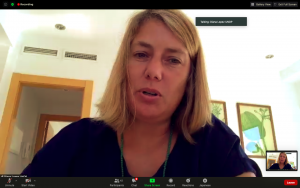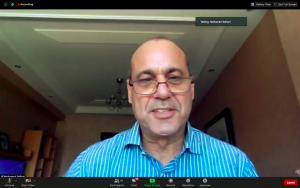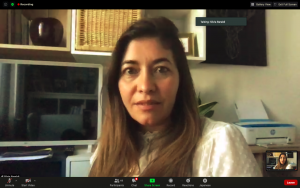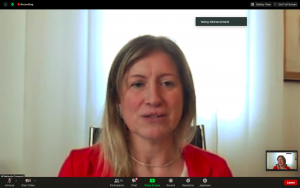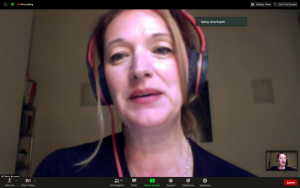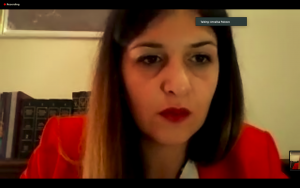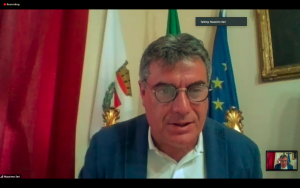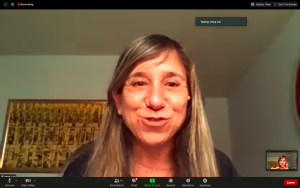
Quello che vorrei condividere è innanzitutto la risposta che è stata data dall’Unione europea alla crisi del Covid. Il secondo filone è in realtà in che cosa la Commissione Europea cambierà e se cambierà le strategie rispetto a quelle definite al principio del mandato e il terzo punto è che cosa farà con le Autorità locali.
Innanzitutto relativamente alla prima parte sul Covid, l’8 aprile la Commissione ha adottato una comunicazione sul Covid che indica la strategia di intervento a favore dei paesi partner o, più generalmente, dei Paesi in via di sviluppo.
Come appartenente alla Commissione della DG Sviluppo, parlo della Commissione in relazione agli interventi effettuati in ambito di cooperazione allo sviluppo, quindi di cooperazione internazionale. La Commissione ha adottato una comunicazione l’8 aprile scorso mettendo a disposizione una quantità di denaro pari a 15.6 bilioni di euro a favore del Covid.
Come è possibile parlare di 15,6 bilioni di euro a favore del Covid nel momento in cui siamo in chiusura della programmazione multi-annuale, cioè quello che per noi viene definito MFF, Multiannual Financial Framework?
Come ben sappiamo, la nuova Commissione europea della Presidente von der Leyen ha cominciato qualche mese fa, siamo nel pieno del dibattito per adottare il nuovo bilancio e quindi il nuovo Financial Framework, potrebbe risultare incomprensibile il finanziamento di 15,6 bilioni di euro stabiliti a favore del Covid.
Non è strano perché quello che si è effettuato è stato un grandissimo dispiegamento di forze sia nel headquarter che al livello delle delegazioni, che hanno portato tutti a lavorare in un’impresa, che sa di miracoloso, per trasformare parte dei programmi già elaborati, che sono già stati adottati dalla Commissione e dagli Stati membri, attraverso tutti i processi che garantiscono la trasparenza nell’uso dei fondi.
Quindi i fondi erano già stati attribuiti ai vari paesi e alle varie tematiche. Sono stati ristudiati sostanzialmente con l’aiuto dei colleghi in delegazione e attraverso il riorientamento, attraverso il cambiamento di accordi, di programmi, con l’inserimento di nuove priorità e di nuove urgenze; si è ristabilito di utilizzare parte dei fondi del precedente MFF, che erano stati già parzialmente o totalmente attribuiti, per affrontare tre linee di priorità, dettate dall’emergenza nei paesi nei quali siamo presenti ed operiamo, col coinvolgimento di tutti gli attori sul campo, quindi dei nostri colleghi, che riportavano la situazione per programma e per paese.
Si è utilizzato il “topping-up” , la possibilità cioè di spostamenti di fondi con delle procedure di emergenza in tempo di crisi che consente la riduzione delle tempistiche di utilizzazione dei fondi nei settori di maggiore importanza che sono quelli relativi all’acqua, alle misure igienico-sanitarie, al trattamento dei rifiuti e alla salute.
Il terzo filone assorbe la grossa quantità dei fondi; stiamo parlando per il primo filone di 500 milioni di euro mentre il restante (15 bilioni) sono stati distribuiti tra i due pilastri: il pilastro degli interventi di medio periodo, gli interventi di lungo periodo che sono quelli che riguardano la ripartenza di tipo economico e sociale.
Il pacchetto che la Commissione ha preparato ha condotto a mettere insieme non solamente i fondi della Commissione Europea ma, come ho detto al principio, del sistema dell’Unione Europea. Si sono quindi stretti attorno alla Commissione i Paesi membri, le agenzie e le banche di finanziamento, insieme quindi alla Banca europea degli investimenti, la Banca europea per la ricostruzione e lo sviluppo.
Tutti i differenti attori hanno fatto convogliare la loro disponibilità di fondi nei tre pilastri per l’emergenza immediata, le misure preventive, le campagne di sensibilizzazione, i test diagnostici, le misure di medio periodo, le misure maggiormente di tipo sanitario, acqua e igiene, le misure di creazione invece di impiego di intervento nel settore della protezione sociale a causa della perdita di lavoro di coloro che sono impiegati nei settori dell’economia informale e poi per la ripartenza di più lungo periodo.
Se questo è stato l’intervento immediato della Commissione, è stato necessario effettuare anche una sorta di ripensamento sulla strategia che era stata definita dalla Presidente e dalla nostra Commissaria europea Urpilainen.
E’ accaduto in realtà che la crisi ha determinato l’utilizzo di una lente di ingrandimento che ha messo in evidenza difficoltà e situazioni di crisi laddove già esistevano. Non ha sottratto valore alle priorità e al piano strategico e al piano di politiche definito dalla Commissione sei mesi fa, ma gli ha ridato valore.
Vorrei ricordarvi che gli obiettivi prioritari della Commissione che la nostra Commissaria Urpilainen ha riaffermato, pur in presenza di Covid Crises e delle risposte da dare nell’immediato, le priorità che riafferma sono le stesse che la Commissione ha espresso e manifestato al livello di politica interna sempre con capitoli di politica internazionale negli ultimi due/tre mesi: il Green Deal e l’importanza degli interventi in relazione al cambiamento climatico. Il Green Deal viene riaffermato come area prioritaria di intervento e la DG DEVCO si sta muovendo per garantirne l’implementazione, così come viene definito nel sistema della politica interna anche in ambito di cooperazione allo sviluppo.
Il secondo, la digitalizzazione: il “Digital Gap” fa emergere ancor più l’importanza dell’Agenda digitale.
Quindi: digitalizzazione, Green Deal, migrazioni.
La Job Growth Creation è particolarmente rilevante sia nell’ambito della politica di sviluppo stabilita dalla Commissione che nel riavviare i processi di crescita economica e sociale nel periodo subito dopo la crisi.
Diciamo che, in linea di definizione di politiche e strategie, tutto quello che la Commissione ha determinato nei primi cento giorni di Governo e che si sono evidenziati nell’adozione di differenti politiche in queste cinque priorità che ho definito, continuano ad essere valide nella politica interna e nella politica di cooperazione allo sviluppo.
Un altro tema che volevo condividere è l’importanza della cooperazione decentrata, importanza della cooperazione internazionale e delle autorità locali.
In che cosa si estrinsecano? Si estrinsecano in interventi da parte della Commissione a vantaggio di differenti tipi di aree e differenti tipi di modalità. E’ emerso nel corso del webinar di oggi l’importanza di non considerare solamente le regioni, ma anche i comuni, le municipalità, le varie autorità locali come attori che possono far parte e portare avanti la cooperazione internazionale.
La Commissione ha sempre avuto nello strumento finanziario per la cooperazione allo sviluppo, una linea di bilancio che è stata a favore delle autorità locali; tutte le autorità locali potevano godere della cooperazione, evidentemente questo a livello dei paesi partner, a livello dei nostri paesi in via di sviluppo.
Negli ultimi due anni abbiamo promosso la cooperazione decentrata, promuovendo dei partenariati tra le autorità locali cosiddette del nord dei paesi dell’Unione Europea e le autorità locali dei paesi partner. Quindi abbiamo lanciato, non più come veniva effettuato fino al 2018, chiamate a proposizione delle possibilità di presentare delle proposte effettuate dalle nostre singole delegazioni in Ghana, piuttosto che in Colombia, in Nepal o in Cambogia.
Abbiamo ricentralizzato al livello di Bruxelles i fondi della linea tematica a vantaggio delle autorità locali e abbiamo quindi lanciato una call for proposal che mette in evidenza l’importanza della creazione di partenariati, partenariati tra autorità locali dell’Unione europea e partenariati di autorità locali dei paesi terzi. Abbiamo finanziato i primi sedici partenariati e stiamo adesso valutando, nel pieno del processo di valutazione, dei nuovi partenariati sulla base di una seconda call.
E’ evidente che i precedenti partenariati, che sono stati costituiti tra città e città, oggi sono stati travolti dalla crisi e quindi hanno chiesto, e chiederanno, di modificare (attraverso degli addendum, nuovi documenti di contratto) parte delle loro azioni per integrare in questi partenariati la possibilità di affrontare anche le conseguenze della crisi. Le nuove richieste che finanzieremo, e che stiamo valutando in questo periodo, e che saranno pronte a partire alla fine dell’anno 2020, faranno altrettanto.
Il 2021 è l’anno in cui comincia la nuova programmazione di sette anni della Commissione Europea 2020-2021-2027.
La Commissione ha presentato un progetto un anno fa sui vari strumenti finanziari e in quello finanziario che si occupa della cooperazione internazionale e della cooperazione allo sviluppo (NDICI non si prevede la possibilità di un’apertura della linea di bilancio a favore delle autorità locali.
Perché è accaduto questo? Perché la Commissione e gli Stati membri hanno ritenuto necessario cercare di integrare i programmi di intervento a favore delle autorità locali in quello che viene definito la “programmazione Paese”. Ogni Paese ha, infatti, una programmazione strategica di intervento che la Commissione ha elaborato in partenariato col Ghana, Marocco, Tunisia, etc.
All’interno di questo programma vengono definite delle linee generali di intervento. La proposta della Commissione, che è stata accolta dal Consiglio, quindi da tutti gli Stati membri, è di inserire il supporto alle autorità locali nei paesi in via di sviluppo dentro i “Programmi Paese”.
Per far questo, è necessaria una consultazione con le Associazioni nazionali delle autorità locali, perché non sarebbe possibile farla con tutte le autorità locali, in quanto la consultazione prevede anche la società civile, il settore privato di tutti gli Stati membri. Gli interlocutori di maggiore rilevanza in Zambia come in Ruanda sono le Associazioni nazionali di autorità locali. Stiamo incoraggiando i nostri partner strategici (Platforma e UCLG, tra gli altri). Fondamentale è l’inserimento degli interventi a favore delle autorità locali incluse il peer to peer exchanges, partenariati al livello del Programma paese.
Stiamo lavorando a favore della possibilità di inserire di nuovo, ma questo è da vedere nell’evoluzione, la possibilità dentro i programmi regionali di riprendere lo strumento delle call for proposal al livello della programmazione regionale.
What I would like to share first of all is the response that the European Union has given to the Covid crisis. The second strand is actually what the European Commission will change and whether it will change its strategies from those defined at the beginning of the mandate and the third point is what it will do with the local authorities.
First of all, with regard to the first strand on Covid, on 8 April the Commission adopted a communication on Covid which sets out the strategy for intervention in favour of partner countries or, more generally, developing countries.
As a member of the Commission of DG Development, I speak of the Commission in relation to interventions in the field of development cooperation, i.e. international cooperation.
The Commission adopted a communication on 8 April last year, making EUR 15.6 billion available for Covid.
How is it possible to speak of EUR 15.6 billion in favour of Covid at a time when we are at the close of multi-annual programming, that is to say, what we call the MFF, Multiannual Financial Framework?
As we well know, the new European Commission of President von der Leyen started a few months ago, we are in the middle of the debate to adopt the new budget and therefore the new Financial Framework, it may be incomprehensible that EUR 15.6 billion has been set aside for Covid.
It is not strange because what has taken place is a huge deployment of forces both in the headquarters and at delegation level, which has led everyone to work in an undertaking, which smells like a miracle, to transform part of the programmes already drawn up, which have already been adopted by the Commission and the Member States, through all the processes that ensure transparency in the use of funds.
So the funds had already been allocated to the various countries and themes. They were substantially re-examined with the help of my colleagues in the delegation and through the reorientation, through the change of agreements, of programmes, through the inclusion of new priorities and new urgencies; it was re-established to use part of the funds of the previous MFF, which had already been partially or totally allocated, to address three lines of priorities, dictated by the emergency in the countries in which we are present and operating, with the involvement of all the actors on the ground, therefore our colleagues, who reported the situation by programme and by country.
The topping-up has been used That is to say, the possibility of moving funds with emergency procedures in times of crisis, which makes it possible to reduce the time taken to use the funds in the most important areas, which are those relating to water, sanitation, waste treatment and health.
The third strand absorbs the large amount of funds; we are talking about the first strand of EURÂ 500Â million, while the remaining EURÂ 15Â billion have been distributed between the two pillars: the medium-term intervention pillar, the long-term interventions, which are those that concern the economic and social restart.
The package that the Commission has prepared has led to put together not only the funds of the European Commission but, as I said at the beginning, the European Union system. The Member States, the agencies and the financing banks, together with the European Investment Bank, the European Bank for Reconstruction and Development, have therefore been united around the Commission.
All the different actors have channelled their funds into the three pillars for immediate emergency, preventive measures, awareness-raising campaigns, diagnostic tests, medium-term measures, more health, water and hygiene measures, creation measures instead of the use of intervention in the social protection sector due to the loss of jobs of those employed in the informal economy and then for the longer term restart.
If this was the immediate intervention of the Commission, there was also a sort of rethinking of the strategy that had been defined by the President and our European Commissioner Urpilainen.
What actually happened was that the crisis resulted in the use of a magnifying glass which highlighted difficulties and crisis situations where they already existed. It has not taken value away from the priorities and the strategic plan and the policy plan defined by the Commission six months ago, but it has given it value back.
I would like to remind you that the priority objectives of the Commission that our Commissioner, Mrs Urpilainen, has reaffirmed, despite the presence of Covid Crises and the responses to be given in the immediate future, are the same priorities that the Commission has expressed and manifested at the level of internal policy, always with chapters on international policy in the last two/three months: the Green Deal and the importance of action in relation to climate change.
The Green Deal is reaffirmed as a priority area of intervention and DG DEVCO is moving to ensure its implementation, as defined in the internal policy system also in the field of development cooperation.
Secondly, digitization: the “Digital Gap” brings out even more the importance of the Digital Agenda.
So: digitization, Green Deal, migration.
Job Growth Creation is particularly relevant both in the context of the development policy established by the Commission and in restarting the processes of economic and social growth in the period immediately after the crisis.
Let us say that, in line with the definition of policies and strategies, everything that the Commission has determined in the first hundred days of government and that have been highlighted in the adoption of different policies in these five priorities that I have defined, continue to be valid in internal policy and in development cooperation policy.
Another theme I wanted to share is the importance of decentralised cooperation, the importance of international cooperation and local authorities.
What do they stand for? They are expressed in interventions by the Commission for the benefit of different types of areas and different types of arrangements. It emerged during today’s webinar that it is important to consider not only the regions, but also the municipalities, the municipalities, the various local authorities as actors that can be part of and carry on international cooperation. The Commission has always had in the financial instrument for development cooperation, a budget line which has been in favour of local authorities; all local authorities could enjoy cooperation, obviously at the level of our partner countries, at the level of our developing countries.
Over the last two years we have promoted decentralised cooperation, promoting partnerships between the so-called local authorities in the north of the European Union countries and the local authorities in the partner countries. So we have launched, no longer as it was until 2018, calls for proposals from our individual delegations in Ghana, rather than in Colombia, Nepal or Cambodia.
We have re-centralised the funds from the thematic line for the benefit of local authorities at Brussels level and have therefore launched a call for proposals highlighting the importance of creating partnerships, partnerships between local authorities in the European Union and partnerships of local authorities in third countries. We financed the first sixteen partnerships and we are now assessing, in the middle of the evaluation process, new partnerships on the basis of a second call.
It is clear that the previous partnerships, which were set up between cities and towns, have now been overwhelmed by the crisis and have therefore asked, and will ask, to amend (through addenda, new contract documents) part of their actions to include in these partnerships the possibility of also dealing with the consequences of the crisis. The new requests that we will finance, and that we are considering at this time, and that will be ready to start at the end of the year 2020, will do the same.
2021 is the year in which the new seven-year programming of the European Commission 2020-2021-2027 begins.
The Commission presented a project one year ago on the various financial instruments and the financial instrument dealing with international cooperation and development cooperation (NDICI).
Why did this happen? Because the Commission and the Member States considered it necessary to try to integrate the intervention programmes for local authorities into what is known as ‘country programming’. Each country has a strategic intervention programming which the Commission has drawn up in partnership with Ghana, Morocco, Tunisia, etc.
. Within this programme, general lines of action are defined. The Commission’s proposal, which has been accepted by the Council and therefore by all Member States, is to include support to local authorities in developing countries within the “Country Programmes”.
To do this, consultation with the national associations of local authorities is necessary, because it would not be possible to do it with all local authorities, as the consultation also involves civil society, the private sector in all Member States. The most important interlocutors in Zambia as in Rwanda are the National Associations of Local Authorities. We are encouraging our strategic partners (Platforma and UCLG, among others).
Fundamental is the inclusion of interventions in favour of local authorities including peer to peer exchanges, partnerships at Country Programme level.
We are working in favour of the possibility of including again, but this is to be seen in the evolution, the possibility within the regional programmes to take up the instrument of calls for proposals at the level of regional programming.

